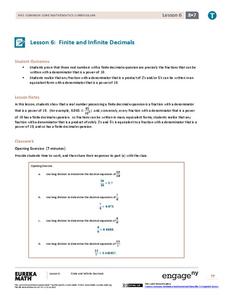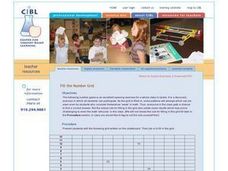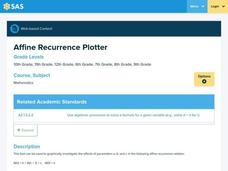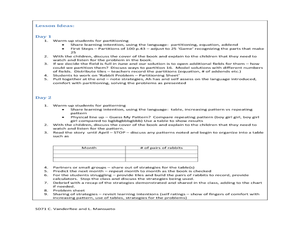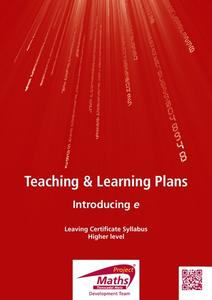EngageNY
Finite and Infinite Decimals
Explore the patterns of fractions that produce finite and infinite decimals. The sixth lesson of the series asks learners to determine a similar feature of fractions that produce finite decimals. Using the patterns, pupils create...
Curated OER
Using Bar Graphs to Understand Voting Patterns
Bar graphs are used as a way to study voting patterns in the United States. A variety of statistical data is presented in the graphs, and pupils must interpret the data in order to make a report to the class. Three excellent graphs,...
Kenan Fellows
Dinner Party: Using Pattern Trains to Demonstrate Linear Functions
Nothing fancy here ... just your run-of-the-mill Algebra party! Learners explore the patterns of linear functions while designing seating arrangements for a dinner party. Comparing the number of tables to the perimeter of the combined...
Hawaiʻi State Department of Education
Rhythm Patterns
Fractions can be tricky. Why not have kids think of fractions like they think of eighth, quarter, and half notes? In teams, the class creates four-measure patterns with their percussion instruments. They need to explain their rhythm...
Teach Engineering
Discovering Relationships Between Side Length and Area
Consider the relationship between side length and area as an input-output function. Scholars create input-output tables for the area of squares to determine an equation in the first installment of a three-part unit. Ditto for the area of...
EngageNY
Decimal Expansions of Fractions, Part 2
Develop your pupils' understanding of fractions and their decimal equivalence using the 12th lesson in this series. Scholars learn an alternative to long division that results in converting fractions to decimals that emphasize fractional...
Curated OER
Fill the Number Grid
Patterns emerge as the class works together to fill in a number grid. This whole group activity is designed to make all learners feel successful, and ultimately turns into a lesson on the least common multiple.
National Security Agency
Equations and Expressions
Learners demonstrate their knowledge pictorially, concretely, and abstractly in this unit meant to last three hours over three days. Using hands-on activities, manipulatives, real-world applications, and problem solving, learners write...
EngageNY
Logarithms—How Many Digits Do You Need?
Forget your ID number? Your pupils learn to use logarithms to determine the number of digits or characters necessary to create individual ID numbers for all members of a group.
Virginia Department of Education
Integers: Addition and Subtraction
Young mathematicians construct their own understanding of integers with an inquiry-based math lesson. Using colored chips to represent positive and negative numbers, children model a series of addition and subtraction problems as they...
EngageNY
Similarity and the Angle Bisector Theorem
Identifying and verifying reproducible patterns in mathematics is an essential skill. Mathematicians identify the relationship of sides when an angle is bisected in a triangle. Once the pupils determine the relationship, they prove it to...
Math Worksheets Land
Patterns of Association (Using Data Tables) - Guided Lesson
The activity belongs to a four-part resource that applies percentages to data tables. The page has three practice problems that continues with the development of this topic.
Charleston School District
Tables of Linear Functions
Don't forget the tables! The previous lessons in this five-part series examined the linear equation and graph relationship. The current lesson adds tables to the mix. At completion, individuals should be able to create a table of values,...
Curated OER
Affine Recurrence Plotter
Learners use the on-line affine recurrence plotter to graph equations. They work on-line to create graphs of trout in a trout pond and savings account balances when interest is compounded over time. Links to the four one-day lessons are...
Curated OER
Math: The Cathedral Project
Second graders take a field trip to a nearby church or other historical building and examine it from a mathematical perspective. In groups, they calculate the seating capacity, describe the window patterns, differentiate types of...
Charleston School District
Constructing Rotations
An instructive lesson provides the basics on how to perform rotations on the coordinate plane. The handout also covers rotating about a point other than the origin and how to perform a series of transformations.
Curated OER
Two for One Box Company
Here is a challenging and thought-provoking math learning exercise. In it, learners work together to construct a variety of boxes of different sizes to see if doubling the size of a box really means it can hold twice as much stuff as the...
Curated OER
Applied Science - Science and Math Lab
Students investigate topology. In this Applied Science lesson students explore higher, more abstract mathematics using tangles. Students make topologically related shapes.
Curated OER
Using Numbers Everywhere
Kindergarteners explore various representations and uses of numbers to develop number sense. They participate in an activity and arrange patterns into groups. Students compare the sets and describe the objects in each set.
Math Worksheets Land
Patterns of Association (Using Data Tables) - Independent Practice Worksheet
Here is a worksheet that belongs in a four-part resource that has learners practice using data tables to calculate percentages. The page has ten problems with different data tables asking to find different percents.
Lesson This!
Math Lesson Plan: Handprint Counting by 5's
A handprint worksheet is provided to help youngsters practice skip counting by 5s. As a follow up, you could have little ones gather into groups to skip count their own fingers by fives.
Curated OER
The Rabbit Problem
Students notice a number pattern in the book The Rabbit Problem by Emily Gravett. In this number pattern instructional activity, students represent and describe numbers appropriate to their grade level.
Curated OER
I Can Use a Worm to Count
Kindergarteners use worms, puppets or other props to practice counting to 100. First, they listen to a read aloud of Count Worms by Roger Hargeaves. A worm pattern is used to count to 100, with each segment of the worm representing a...
Project Maths
Introduction to e
First there was pi and now there's e. A discovery-based lesson helps learners find a pattern in compound interest as the compounding period changes. Their investigation results in the discovery of the number e. The lesson is the first in...


